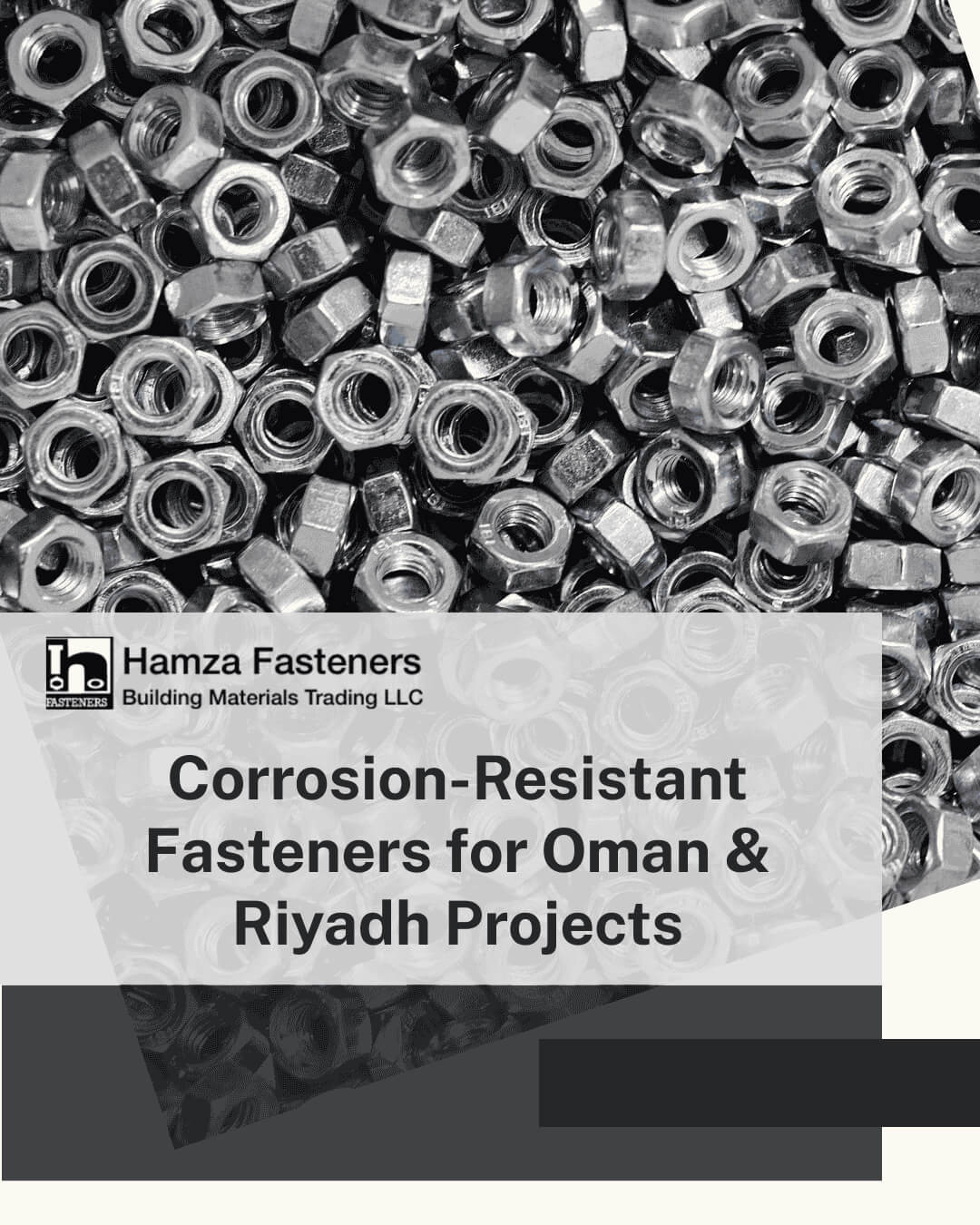
The Middle East’s infrastructure and construction industries, especially in Oman and Riyadh, are growing at an unprecedented scale. With the mega projects in oil & gas, industrial units, high-rise buildings, and transport infrastructure, the need for high-performance materials has never been more urgent.
One of the most essential yet oft-neglected components of these projects is the selection of fasteners. In areas where the climate varies from humid seashore conditions to harsh desert temperatures, corrosion-resistant fasteners are not only a choice, they are a requirement.
Oman’s coastal towns such as Muscat and Sohar are exposed to saline air and high humidity, whereas Riyadh is subject to intense heat and sporadic sandstorms. These conditions hasten metal corrosion.
Conventional fasteners corrode rapidly at the expense of safety and structural integrity. This is why industries give prime importance to corrosion-resistant fasteners, which provide long-term durability and reduced maintenance costs.
Corrosion can be defined as the degradation of a metal due to a reaction with its environment. Degradation implies deterioration of physical properties of the material. In everyday terms, corrosion is the process by which metals gradually weaken and break down when exposed to factors such as moisture, oxygen, salt, or chemicals. The most familiar example is rusting of
iron, but many metals, including steel, copper, and aluminum, can also corrode. Corrosion not only reduces the strength and appearance of materials but also leads to costly repairs and safety concerns in industries like construction, automotive, and marine. Understanding corrosion and its prevention is essential to extend the life of metal structures and components.
Building projects in both areas demand specialized fastening solutions to accommodate varied project requirements. Some of the most widely sought-after materials are:
Stainless steel fasteners are among the most popularly used in Oman’s coastal facilities and Riyadh’s big-ticket developments. With their rust- and oxidation-resistant properties, these fasteners are best suited for projects exposed to seawater and desert environments.
For applications involving both durability and good looks, brass fasteners are a popular selection. Their inherent resistance to tarnish qualifies them for indoor uses in upscale hotels, business complexes, and Riyadh’s heritage restoration projects.
When heavy industrial applications in Oman’s ports or Riyadh’s oil refineries need long-term strength, coated solutions offer added protection. Galvanized fasteners are especially ideal, with their zinc coating shielded from corrosive substances, thereby suitable for structural and exterior use.
For oil & gas plants and offshore platforms, hot dipped galvanized fasteners are the preferred option. They yield a heavy, even coating that resists salt spray, dampness, and heat, guaranteeing consistent performance under the most extreme conditions.
In certain parts of the construction industry, particularly where cost control is vital, MS fasteners (mild steel fasteners) are widely used with protective coating. As they lack the corrosion resistance of stainless steel, though, they are a cheap alternative for less exposed use.
In selecting corrosion-resistant fasteners for Middle Eastern work, engineers and purchasing managers consider:
As Oman and Riyadh keep investing in mega projects under Vision 2040 and Vision 2030 respectively, the role of trusted fastening solutions will become increasingly important. Sustainability is also becoming a prime concern, encouraging industries to adopt green-friendly materials and high-end coatings.
Corrosion-resistant, strong, and economical fasteners will be in demand. With advances in materials science, new hybrid fasteners that offer better protection against harsh weather and industrial contaminants are in the process of development.
Stainless steel, titanium, silicon bronze, and certain polymer-coated fasteners are considered corrosion-proof.
Common coatings include zinc plating, hot-dip galvanizing, cadmium plating, epoxy, and ceramic coatings.
Stainless steel 316 (marine grade) and titanium fasteners are typically used in highly corrosive environments.
Marine-grade stainless steel (316) or silicon bronze fasteners are best for resisting saltwater and humidity.
In Oman’s and Riyadh’s tough environments, selecting the appropriate corrosion-resistant fasteners is not a technical choice, it’s a strategic investment in cost savings, durability, and safety. Whether stainless steel is used on marine projects, brass on luxury developments, galvanized on infrastructure, or hot dipped galvanized on offshore activities, making the right choice means every building withers the test of time.
From oil platforms off Oman’s coast to skyscrapers that dominate Riyadh’s skyline, the prospects for construction and industrial expansion in the Gulf rest on secure fastening solutions that will resist nature’s extremes as well as the stresses of contemporary engineering.
Such companies as Hamza Fasteners Building Materials Trading LLC have shown this strategy by offering the best fastening products such as Allen cap bolts, nuts, anchors, screws, self-tapping screws, drill bits, U bolts, and L bolts so that customers can have the best quality fasteners to every project requirement.